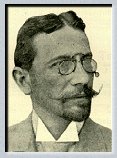Philidor
| Morphy | Tarrasch | Lasker
| Pillsbury | Rubinstein
| Niemzowitsch | Capablanca
| Reti | Alekhine
| Najdorf | Reshevsky
| Khan
. . . . . . . . . . . . . . . . . . . . . . . .
Siegbert
Tarrasch
 The
great chess player Dr. Siegbert Tarrasch was born in Breslau, Germany
on March 5, 1862, the site of Dr. Lasker's great two bishop sacrifice
in 1887 (in Lasker's first Masters tournament). He was born with a club
foot, but he noted once that it did not hinder his progress.
The
great chess player Dr. Siegbert Tarrasch was born in Breslau, Germany
on March 5, 1862, the site of Dr. Lasker's great two bishop sacrifice
in 1887 (in Lasker's first Masters tournament). He was born with a club
foot, but he noted once that it did not hinder his progress.
Tarrasch was a great scholar, excelling in all subjects but mathematics. At 15, he learned the game of chess. He was mostly astonished that there were books written about chess.
Young Tarrasch devoured in an unsystematic but efficient way, all of the chess literature available to him. Breslau was perfect for this Ö the immortal Adolph Anderssen had been born in Breslau and taught at one of the universities there. Tarrasch displayed a marked aptitude for chess from the very start, and became so absorbed in the game that he had little time left for such trifles such as homework. He made up for the lost time with more diligent study. He graduated in the study of medicine, and then went to the University of Berlin to complete his studies.
His first attempt in a "Hauptturnier", to become chess master (only the winner gets the title of master), failed in 1882. In 1883, however, he won first prize at the Hauptturnier at Nuremberg and the title of Master in scintillating style.
By the time Tarrasch sent in his entry for the International Tournament at Hamburg in 1885, he had passed all examinations and was a full-fledged physician. Then, and later, he was to know how taxing it is to combine tournament chess with the practice of another profession. At Hamburg, Dr. Tarrasch ended up in a 5-way tie with Blackburne, Englisch, Mason and Weiss, all Internationally known players, ‡ point behind the winner Gunsberg. Both Steinitz and Zukertort acclaimed the 23-year old player's chess prowess.
At Frankfort, 1887, he only tied for 5th prize. But it was a strong tournament. In 1888 he came in last at Leipzig, after winning a small tournament at Nuremberg. But things changed in 1889. He came in first at Breslau, 1889; Berlin, 1889; Manchester, 1890; Dresden, 1892; and Leipzig, 1894. He tied a match with the legendary Tchigorin in 1893.
At this point Tarrasch earned the right to be reckoned with, and sure enough, received an offer to play Wilhelm Steinitz in a match for the World Championship. Tarrasch declined to play because of his medical practice. Steinitz, in dire need of monies, then queried Dr. Emanuel Lasker, who accepted the World Championship match offer. Dr. Lasker won in 1894, and was Chess World Champion for 27 years. While Dr. Lasker was alive, Dr. Tarrasch would be never more than second fiddle, since Dr. Lasker was his chess superior in every way, and one of the greatest chess players that ever lived.
At the famous Hastings tournament of 1895, Dr. Tarrasch came second to the great Pillsbury, and at the great Nuremberg tournament of 1896, Dr. Tarrasch came second to Dr. Lasker. He won first prize in the marathon tournament at Vienna in 1898, but Dr. Lasker didn't participate. In 1905, he beat the US Champion Frank Marshall overwhelmingly in their match, and in 1907, Dr. Tarrasch won the Ostend Championship in classy style. In 1914, he beat his then theoretical archrival Nimzowitch in a famous two bishop sacrifice, and went on to be one of the 5 original Grandmasters named by Czar Nicholas (Lasker, Capablanca, Alekhine, Tarrasch and Marshall).
From that point on, he basically spent his chess time writing chess books, some of the most lucid ever written. In his last book, The Game of Chess, he wrote the following passage:
"Chess
is a form of intellectual productiveness. Therein lies its peculiar charm.
Intellectual productiveness is one of the greatest joys --- if not the
greatest one --- of human existence. It is not everyone who can write
a play, or build a bridge, or even make a good joke. But in chess everyone
can, everyone must, be intellectually productive and so can share in this
select delight. I have always a slight feeling of pity for the man who
has no knowledge of chess, just as I would pity the man who has remained
ignorant of love. Chess, like love, like music, has the power to make
men happy".
-----Terry Crandall
. . . . . . . . . . . . . . . . . . . . . . . .
Philidor | Morphy | Tarrasch | Lasker | Pillsbury | Rubinstein | Niemzowitsch | Capablanca | Reti | Alekhine | Najdorf | Reshevsky | Khan